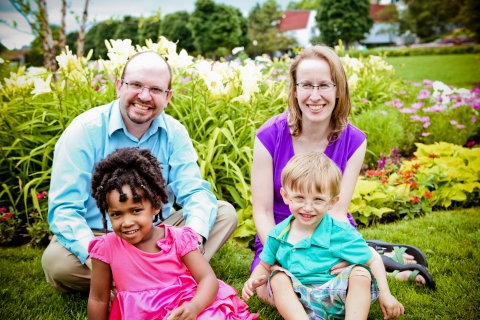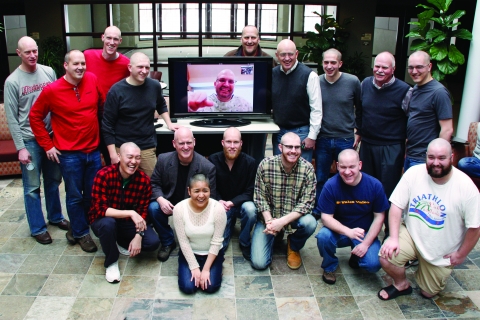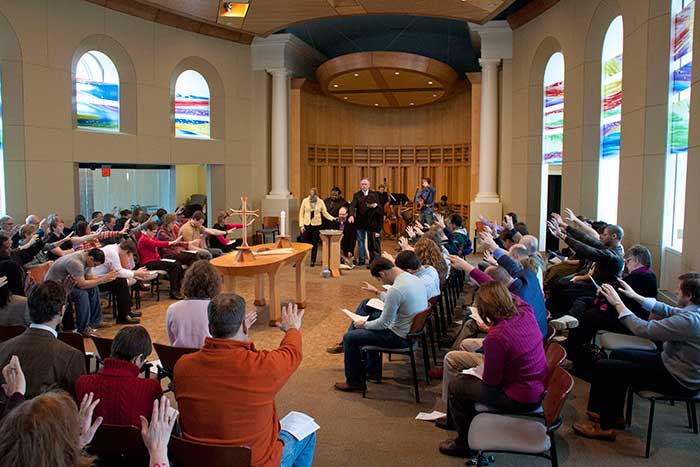Todd Billings was in a fog after finding out he had incurable cancer. In the darkness, he came to understand lament—and God—in new ways.
In the darkness, a theologian meets God in a new way
By J. Todd Billings
“Get well soon! Jesus loves you! God is bigger than cancer!”
My tears ran down as I read these words. They were from a 15-year-old girl with Down syndrome in my congregation.
Less than a week earlier, the doctor spoke the diagnosis to me, about which he had no doubt: an incurable cancer, a fatal disease. I had been in a fog ever since.
How was I to face each day when my future—which had seemed wide open—had suddenly narrowed? My world seemed to be caving in on itself with fog in each direction I turned, so that no light could shine in.
While I had received many cards in the previous days, this one was different. “God is bigger than cancer!” Yes. She did not say, “God will cure you of this cancer,” or “God will suffer with you.” God is bigger than cancer. The fog is thick, but God is bigger.
My cancer story was already developing its own sense of drama, enveloping my whole world so that nothing else could creep in. But God’s story, the drama of God’s action in the world, is bigger. The girl in my church wasn’t denying the fog or the loss but testifying to a God who is greater, the God made known in Jesus Christ, who shows us that “the light shines in the darkness, and the darkness did not overcome it” (John 1:5). God is bigger than cancer, period.
My only comfort
When I announced my cancer at the seminary and in my congregation, I included the following words from Question and Answer 1 of the Heidelberg Catechism: “What is your only comfort in life and in death? That I am not my own, but belong—body and soul, in life and in death—to my faithful Savior, Jesus Christ.” Like the note from the 15-year-old girl in my church, it breaks through the fog of “terminal” and “incurable” and “cancer” by pointing us to the bedrock of what matters: that I belong, in life and in death, to Jesus Christ. My life is not my own.
 Entering into God’s story in the midst of my cancer diagnosis meant coming to pray and worship in a new way. The Psalms—of joy, and also of lament—took on new meaning. In the words of John Calvin, the Psalms are “an anatomy of all the parts of the soul.” The widest possible spectrum of emotions is brought before God: joy and sadness, thanksgiving and anger, gratitude and protest. My heart skipped a beat when a student shared with me that he was praying Psalm 102 for my family—for me, my wife, and two young children:
Entering into God’s story in the midst of my cancer diagnosis meant coming to pray and worship in a new way. The Psalms—of joy, and also of lament—took on new meaning. In the words of John Calvin, the Psalms are “an anatomy of all the parts of the soul.” The widest possible spectrum of emotions is brought before God: joy and sadness, thanksgiving and anger, gratitude and protest. My heart skipped a beat when a student shared with me that he was praying Psalm 102 for my family—for me, my wife, and two young children:
He has broken my strength in mid-course;
he has shortened my days.
“O my God,” I say, “do not take me away
at the midpoint of my life,
you whose years endure
throughout all generations” (vv. 23-24).
The language of lament
The psalmists bring their raw questions before God—persistently wrestling with him because they are convinced that God is both sovereign and faithful. And yet, the mess of their lives does not look like covenant fulfillment. This leads them to bring their grief and protest before the almighty Lord.
More than a third of the Psalms are laments—they are more common than any other type of psalm. Yet I’ve found that expressions of deep grief and loss have often been evacuated from the sanctuary today. When worship expresses only victory, it can unintentionally suggest that the broken and the lonely and the hurting have no place there. But that is not the gospel of Jesus Christ. The gospel is not self-help to make us feel better or a strategy for helping us to accomplish our own goals. The good news of Jesus Christ is that he saves us from ourselves—from our sinful, self-centered ways. We are united to Jesus Christ by the Spirit, and given forgiveness and new life by the Spirit.
This new life involves both lament and rejoicing: we “rejoice with those who rejoice, weep with those who weep” (Romans 12:15). We testify that Jesus Christ is the world’s true king, even though things are a mess, even though his kingdom has not yet fully come. We join the Spirit in groaning, as we await the culmination of our adoption in Christ and “the redemption of our bodies” in the resurrection (Romans 8:23). We ache, we groan, and yet we thank God for his faithfulness. That is what a people who belong to Jesus Christ do as we struggle for the sake of Christ’s kingdom in this dark world (Ephesians 6:12).
Trusting in the darkness
 Through biblical lament, God provides a path for us to trust him in the darkness, even though not all of our questions are answered. Sometimes we’re tempted to resolve our questions through fatalism. A pastor friend of mine was talking to a couple who had just lost a child by a miscarriage. The husband offered no tears. No emotion. Just the words, “It was what God ordained.” The husband may have thought that he was being theologically correct, but his response was neither authentically biblical nor Reformed. Yes, God holds the world in his hands. And yet, the world is not the way it is supposed to be. We need to trust God’s sovereignty, and also join the psalmists, Paul, and Jesus in protest, in lament. For our mediator who petitions on our behalf is the one who joined the voice of the psalmist on the cross: “My God, my God, why have you forsaken me?” (Matthew 27:46, NIV). Jesus bore our anguish so that it would lose its ultimate sting. For Jesus not only suffered and died, but also rose again from the dead.
Through biblical lament, God provides a path for us to trust him in the darkness, even though not all of our questions are answered. Sometimes we’re tempted to resolve our questions through fatalism. A pastor friend of mine was talking to a couple who had just lost a child by a miscarriage. The husband offered no tears. No emotion. Just the words, “It was what God ordained.” The husband may have thought that he was being theologically correct, but his response was neither authentically biblical nor Reformed. Yes, God holds the world in his hands. And yet, the world is not the way it is supposed to be. We need to trust God’s sovereignty, and also join the psalmists, Paul, and Jesus in protest, in lament. For our mediator who petitions on our behalf is the one who joined the voice of the psalmist on the cross: “My God, my God, why have you forsaken me?” (Matthew 27:46, NIV). Jesus bore our anguish so that it would lose its ultimate sting. For Jesus not only suffered and died, but also rose again from the dead.
Thus, in the midst of our suffering, God invites us to both lament, and also rejoice. For our ultimate hope is not to live a long, pain-free life, but to have fellowship with the risen Christ. Right now, our lives are “hidden with Christ in God” (Colossians 3:3). We shouldn’t expect our lives right now to look like a seamless story of victory and success. We may die a death that looks senseless. For our true lives are hidden from sight, for now. But “when Christ who is your life is revealed, then you also will be revealed with him in glory” (Colossians 3:4). In the meantime, we are freed to wrestle with God in our suffering and also rejoice in his unshakeable love in Christ, for this is our most basic identity: that we belong in body and soul, in life and in death, to our faithful savior, Jesus Christ.
J. Todd Billings is Gordon H. Girod research professor of Reformed theology at Western Theological Seminary and author of Rejoicing in Lament: Wrestling with Incurable Cancer and Life in Christ. He attends First Reformed Church in Holland, Michigan.
Spend time in the Psalms, reading psalms of lament (such as Psalm 13) and praying them for yourself or for a friend.
Pray for people in your church who are hurting, and pray that the church welcomes their grief and provides space for lament.
Reflect on times of grief or loss in your own life. Did you come to see God differently? What brought you comfort?





